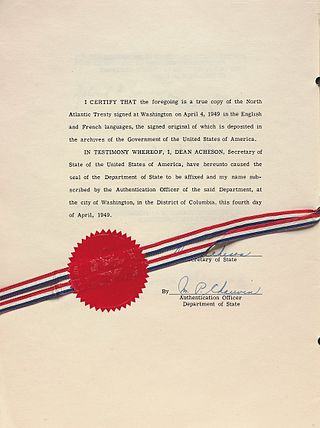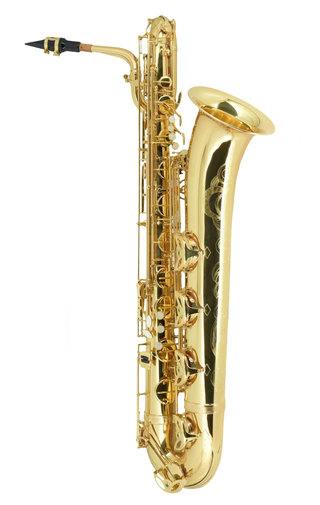Contents
| |||||
| Decades: | |||||
|---|---|---|---|---|---|
| See also: | Other events of 1949 List of years in Belgium | ||||
Events from the year 1949 in Belgium
| |||||
| Decades: | |||||
|---|---|---|---|---|---|
| See also: | Other events of 1949 List of years in Belgium | ||||
Events from the year 1949 in Belgium

Antoine-Joseph "Adolphe" Sax was a Belgian inventor and musician who invented the saxophone in the early 1840s, patenting it in 1846. He also invented the saxotromba, saxhorn and saxtuba, and redesigned the bass clarinet in a fashion still used to the present day. He played the flute and clarinet.

The North Atlantic Treaty, also known as the Washington Treaty, forms the legal basis of, and is implemented by, the North Atlantic Treaty Organization (NATO). The treaty was signed in Washington, D.C., on 4 April 1949.

The saxophone is a type of single-reed woodwind instrument with a conical body, usually made of brass. As with all single-reed instruments, sound is produced when a reed on a mouthpiece vibrates to produce a sound wave inside the instrument's body. The pitch is controlled by opening and closing holes in the body to change the effective length of the tube. The holes are closed by leather pads attached to keys operated by the player. Saxophones are made in various sizes and are almost always treated as transposing instruments. A person who plays the saxophone is called a saxophonist or saxist.

Paul-Henri Charles Spaak was an influential Belgian Socialist politician, diplomat and statesman who thrice served as the prime minister of Belgium and later as the second secretary general of NATO. Along with Robert Schuman, Alcide De Gasperi and Konrad Adenauer, he was a leader in the formation of the institutions that evolved into the European Union.

The baritone saxophone is a member of the saxophone family of instruments, larger than the tenor saxophone, but smaller than the bass. It is the lowest-pitched saxophone in common use — the bass, contrabass and subcontrabass saxophones are relatively uncommon. Like all saxophones, it is a single-reed instrument. It is commonly used in concert bands, chamber music, military bands, big bands, and jazz combos. It can also be found in other ensembles such as rock bands and marching bands. Modern baritone saxophones are pitched in E♭.

The sopranino saxophone is the second-smallest member of the saxophone family. It is tuned in the key of E♭, and sounds an octave higher than the alto saxophone. A sopranino in F was also described in Adolphe Sax's patent, an octave above an F alto (mezzo-soprano), but there are no known built instruments.

De Grootste Belg was a 2005 vote conducted by Belgian public TV broadcaster Canvas, public radio broadcaster Radio 1, and newspaper De Standaard, to determine who is the Greatest Belgian of all time. It could be considered as a Flemish list, considering that French-speaking community broadcast RTBF also held a vote, Le plus grand Belge. Nominees needed to have lived between 50 BC and now, between the borders of present-day Belgium. This is because Belgium only gained its independence in 1830, while numerous historical individuals from, for example, the Spanish Netherlands, are considered to be "Belgians".

The Royal Conservatory of Brussels is a historic conservatory in Brussels, Belgium. Starting its activities in 1813, it received its official name in 1832. Providing performing music and drama courses, the institution became renowned partly because of the international reputation of its successive directors such as François-Joseph Fétis, François-Auguste Gevaert, Edgar Tinel, Joseph Jongen and Marcel Poot, but more because it has been attended by many of the top musicians, actors and artists in Belgium such as Arthur Grumiaux, José Van Dam, Sigiswald Kuijken, Josse De Pauw, Luk van Mello and Luk De Konink. Adolphe Sax, inventor of the saxophone, also studied at the Brussels Conservatory.
Antoinette Spaak was a Belgian politician and leading figure within Francophone and regionalist politics in Brussels. She was born into a noted political family and entered politics as part of the regionalist Democratic Front of Francophones in 1972. She held the presidency of the FDF from 1977 to 1982 and later advocated conciliation between Francophone centrist political parties. This brought the FDF into an electoral coalition ahead of the 1999 election and paved the way for its absorption into the Reformist Movement in 2002. Spaak held various political offices in Belgium and the European Communities until retiring from politics in 2009.

The year 1948 marked the beginning of the institutionalised modern European integration. With the start of the Cold War, the Treaty of Brussels was signed in 1948 establishing the Western Union (WU) as the first organisation. In the same year, the International Authority for the Ruhr and the Organization for European Economic Co-operation, the predecessor of the OECD, were also founded, followed in 1949 by the Council of Europe, and in 1951 by the European Coal and Steel Community, with the ensuing moves to create further communities leading to the Treaty of Rome (1957).

The Château of Val-Duchesse is a château and estate in the municipality of Auderghem in Brussels, Belgium. The château, which occupies the site of a former priory, is owned by the Belgian Royal Trust.

Baron Robert Rothschild was a Belgian diplomat. He helped to draft the Treaty of Rome of 1957, the foundation of the European Economic Community (EEC) in 1958.
The Paul-Henri Spaak Foundation or Fondation Paul-Henri Spaak located in Brussels (Belgium) was founded in 1973, one year after the death Paul-Henri Spaak, to continue his work on European integration and transatlantic relations. The Foundation organises conferences and seminars, which are published and possesses a major part of Paul-Henri Spaak's archives. Viscount Étienne Davignon is the president of the Foundation.

The secretary general of NATO is the chief civil servant of the North Atlantic Treaty Organization (NATO), an intergovernmental military alliance with 32 member states. The officeholder is an international diplomat responsible for coordinating the workings of the alliance, leading NATO's international staff, chairing the meetings of the North Atlantic Council and most major committees of the alliance, with the notable exception of the NATO Military Committee, as well as acting as NATO's spokesperson. The secretary general does not have a military command role; political, military and strategic decisions ultimately rest with the member states. Together with the chair of the NATO Military Committee and the supreme allied commander, the officeholder is one of the foremost officials of NATO.
Events in the year 1861 in Belgium.
Events in the year 1851 in Belgium.
Events of the year 1939 in Belgium.
Events from the year 1947 in Belgium
Events from the year 1946 in Belgium
Events in the year 1938 in Belgium.